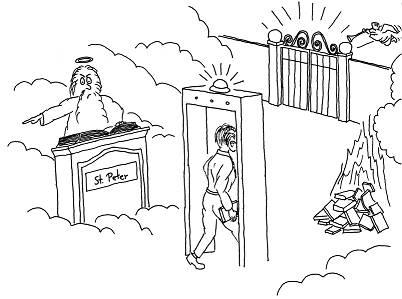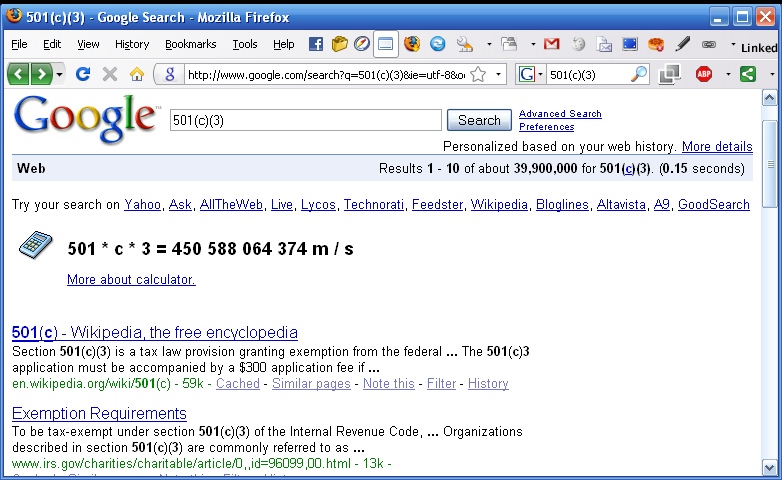From ACU’s new issue of Battleline. ACU board member Joe Morris contributes an email from our new economic Czar:
My Dear American Friend
Issue 117 – October 8, 2008
 MY DEAR AMERICAN FRIEND:
MY DEAR AMERICAN FRIEND:
I AM NEEDING TO ASK YOU TO SUPPORT AN URGENT SECRET BUSINESS RELATIONSHIP WITH A TRANSFER OF FUNDS OF GREAT MAGNITUDE.
I AM MINISTRY OF THE TREASURY OF THE REPUBLIC OF AMERICA. MY COUNTRY HAS HAD CRISIS THAT HAS CAUSED NEED FOR LARGE TRANSFER OF FUNDS OF 700 BILLION OF YOUR DOLLARS ( US). IF YOU WOULD ASSIST ME IN THIS TRANSFER IT WOULD BE MOST PROFITABLE TO YOU.
I AM WORKING WITH HIGHLY REPUTABLE MR. PHIL GRAM, LOBBYIST FOR UBS, WHO WILL BE MY REPLACEMENT AS MINISTRY OF THE TREASURY IN JANUARY IF MY POLITICAL PARTY WINS UPCOMING ELECTION, WHICH WE CERTAINLY WILL BECAUSE WE ARE IN CONTROLING OF THE HIGHEST SUPREME COURT. YOU MAY REMEMBER HIM AS A SENATOR AS LEADER OF THE AMERICAN BANKING DEREGULATION MOVEMENT IN THE 1990S.
I AM ALSO WORKING WITH HIGHLY REPUTABLE MR. BARNEY FRANK, MEMBER OF CONGRESS FROM PEOPLE’S REPUBLIC OF MASSACHUSETTS, WHO WILL BE MY REPLACEMENT AS MINISTRY OF THE TREASURY IN JANUARY IF OTHER POLITICAL PARTY, LED BY MR. BARACK OBAMA, WIN UPCOMING ELECTION, WHICH HE CERTAINLY WILL BECAUSE HE IS IN CONTROLLING OF VOTING IN ILLINOIS, OHIO, FLORIDA, AND MANY OTHER STATES. MR. BARNEY FRANK IS VERY KNOWLEDGEABLE ABOUT FINANCIAL TRANSACTIONS OF ALL KINDS, FROM WHOREHOUSE ADMINISTRATION TO HOME LOAN BUSINESS, AND FAITHFULLY TEACHES PRECEPTS OF MR. BARACK OBAMA (“FROM TINY A.C.O.R.N. GROWS GIANT FORECLOSURE OAK!”).
Continue reading →
Arts+Labs, a new coalition “committed to a better, safer internet that works for both artists and consumers,” has written up Friday’s Cato Institute book forum on The Crime of Reason on their ArtLab blog. Author Robert B. Laughlin of Stanford University will present his book, then we’ll have comments from Tom Sydnor of the Progress and Freedom Foundation.
I’ve gotten a glimpse at the slides Dr. Laughlin will be using, and this Nobel laureate in physics also turns out to be something of an artist.
Join us Friday to learn what this drawing is all about.

I remark briefly on the commentary “how smart is Palin,” noting her mispronunciation of “verbiage” and “pundit.” I’d suggest that observers be wary of assessing qualifications based on this kind of thing. Example: one very well-educated person I know, whose IQ is high enough to qualify enough for Mensa, mispronounces several words because he was socially isolated for his formative years and formed the habit of saying them before he had the chance to hear others pronounce them correctly. I don’t mean he was shut in a closet, which wouldn’t be relevant as Palin clearly hasn’t been, but just that he lived in a rural area where most of his peers were relatively uneducated.
In any case, it is curious that the anxious analysis of Palin, stemming from the fact that she is relatively unknown, seems to turn on characteristics of social class rather than on information about her decision-making as an executive. What significant choices about things like taxes, education policy, resources, and so on was she faced with as governor? What did she do in those situations? Why? What were the alternatives? Many voters probably do elect candidates based on how someone talks or looks, but mightn’t it be nice for a change for the talking classes to assess a candidate on policy? Would she make a better political candidate if some professor had had a couple months to drill her on vocabulary and delivery, like the hapless flower seller Eliza whats-her-name? Continue reading →
Back in the mid- and even late 1990s, I was engaged in a lot of dreadfully boring telecom policy debates in which the proponents of regulation flatly refused to accept the argument that the hegemony of wireline communications systems would ever be seriously challenged by wireless networks. Well, we all know how that story is playing out today. People are increasingly “cutting the cord” and opting to live a wireless-only existence. For example, this recent Nielsen Mobile study on wireless substitution reports that, although only 4.2% of homes were wireless-only at the end of 2003…
At the end of 2007, 16.4 percent of U.S. households had abandoned their landline phone for their wireless phone, but by the end of June 2008, just 6 months later, that number had increased to 17.1 percent. Overall, this percentage has grown by 3-4 percentage points per year, and the trend doesn’t seem to be slowing. In fact, a Q4 2007 study by Nielsen Mobile showed that an additional 5 percent of households indicated that they were “likely” to disconnect their landline service in the next 12 months, potentially increasing the overall percentage of wireless-only households to nearly 1 in 5 by year’s end.
And one wonders about how many homes are like mine — we just keep the landline for emergency purposes or to redirect phone spam to that number instead of giving out our mobile numbers. Beyond that, my wife and I are pretty much wireless-only people and I’m sure there’s a lot of others like us out there.
Anyway, I’ve been having a strange feeling of deva vu lately as I’ve been engaging in policy debates about the future of the video marketplace. Like those old telecom debates of the last decade, we are now witnessing a similar debate — and set of denials — playing out in the video arena. Many lawmakers and regulatory advocates (and even some industry folks) are acting as if the old ways of doing business are the only ways that still count. In reality, things are changing rapidly as video content continues to migrate online.
I was reminded of that again this weekend when I was reading Nick Wingfield’s brilliant piece in the Wall Street Journal entitled “Turn On, Tune Out, Click Here.” It is must-reading for anyone following development in this field. As Wingfield notes:
Continue reading →
A little XKCD-style humor:

If you don’t get it, “c” this. Incidentally, you can easily add links to other search engines (as I have) by installing the CustomizeGoogle Firefox extension, among many other cool features.
Over at CDT’s “Policy Beta” blog, my friends John Morris and Sophia Cope have penned two important essays about online free speech issues that are worthy of your attention. In the first, Sophia argues that the “Next President Must Preserve Free Speech on the Internet.” She argues:
It will be critical for the next President to do his part to uphold the Internet’s robust culture of free speech and innovation as we march further into the 21st Century. In stark contrast to the mass media of the last century, the Internet has provided, at very low cost, virtually unlimited forums for both creators and consumers of new content and technologies. This in turn has created a huge boost for participatory democracy and our economy. The next Administration must reject Congressional or agency efforts to censor content or stifle the fire of innovation on the Internet and other communications media.
Amen! Importantly, Sophia points to the essential role of Section 230 of the Telecommunications Act of 1996, which protects online service providers from crushing legal liability in a variety of circumstances. Sec. 230 is probably the most important — and most often forgotten — law dealing with online freedom. Unfortunately, however, it’s increasingly under attack and we need to be vigilant in defending it. (I’m working on a big paper about that right now with my PFF colleagues Berin Szoka and Adam Marcus).
Continue reading →
Over at TechDirt, Tom Lee has a sharp critique of Muayyad Al-Chalabi’s much-circulated paper (via GigaOm) opposing bandwidth caps. Make sure to read Tom’s entire essay, but here’s the key take-away:
this whitepaper merely amounts to a complaint that a free lunch is ending. Bandwidth is clearly an increasingly limited resource. And in capitalist societies, money is how we allocate limited resources. The alternate solutions that Al-Chalabi proposes to the carriers on pages 6 and 8 — like P2P mirrors, improved service and “leveraging… existing relationships with content providers” — either assume that network improvements are free, would gut network neutrality, or are simply nonsense.
Indeed. But Tom generally agrees that “Comcast’s bandwidth cap is a drag” and that “Instead of disconnection, there should be reasonable fees imposed for overages. They should come up with a schedule defining how the cap will increase in the future. And the paper’s suggestion of loosened limits during off-peak times is a good one.”
Well, those are three different things but I generally agree with all of them. Let me just repeat, however, my strong endorsement of the first option — metering at the margin — and again highlight the optimal way to do it from an economic perspective. As I noted in one of my many previous articles about metering for bandwidth hogs:
Continue reading →
MY DEAR AMERICAN FRIEND:



 The Technology Liberation Front is the tech policy blog dedicated to keeping politicians' hands off the 'net and everything else related to technology.
The Technology Liberation Front is the tech policy blog dedicated to keeping politicians' hands off the 'net and everything else related to technology.